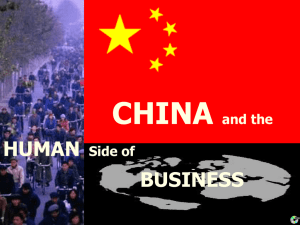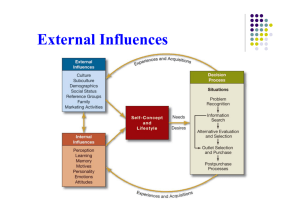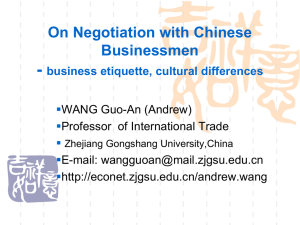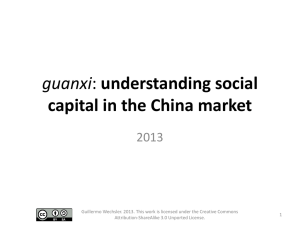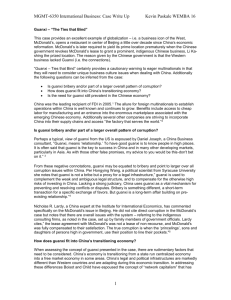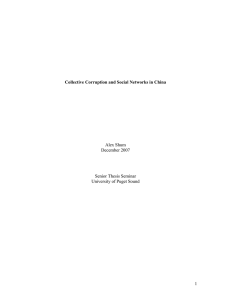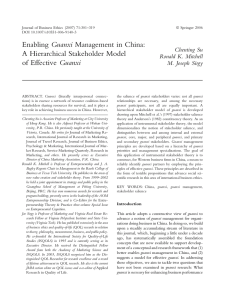Case study: Managing Guanxi in a Swiss
advertisement
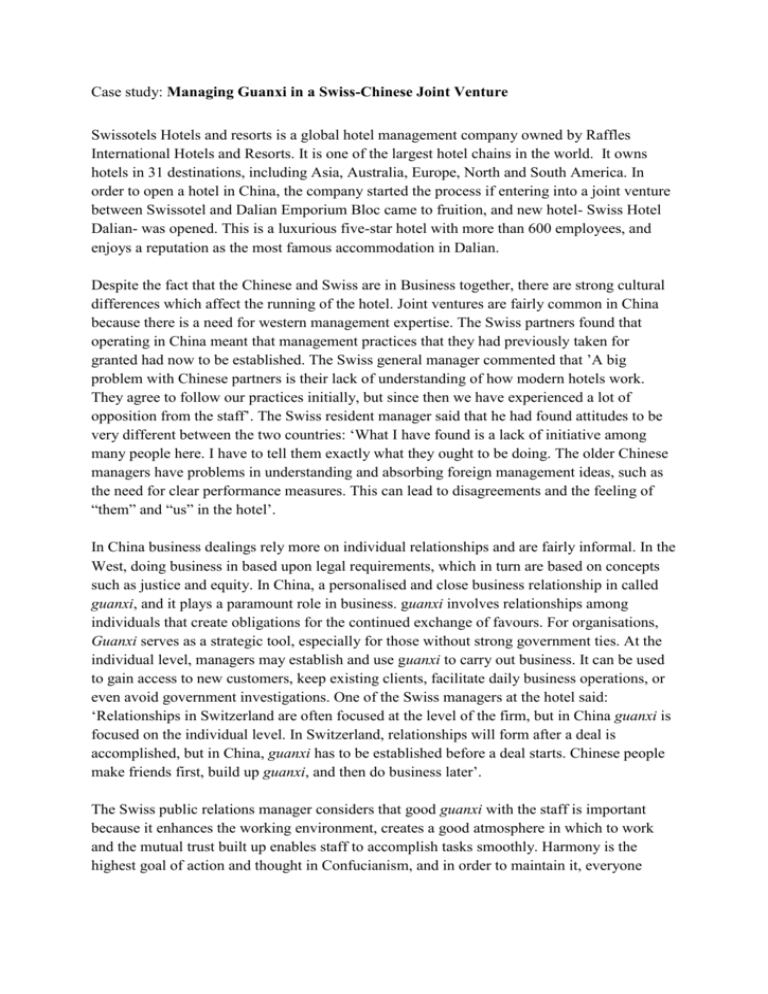
Case study: Managing Guanxi in a Swiss-Chinese Joint Venture Swissotels Hotels and resorts is a global hotel management company owned by Raffles International Hotels and Resorts. It is one of the largest hotel chains in the world. It owns hotels in 31 destinations, including Asia, Australia, Europe, North and South America. In order to open a hotel in China, the company started the process if entering into a joint venture between Swissotel and Dalian Emporium Bloc came to fruition, and new hotel- Swiss Hotel Dalian- was opened. This is a luxurious five-star hotel with more than 600 employees, and enjoys a reputation as the most famous accommodation in Dalian. Despite the fact that the Chinese and Swiss are in Business together, there are strong cultural differences which affect the running of the hotel. Joint ventures are fairly common in China because there is a need for western management expertise. The Swiss partners found that operating in China meant that management practices that they had previously taken for granted had now to be established. The Swiss general manager commented that ’A big problem with Chinese partners is their lack of understanding of how modern hotels work. They agree to follow our practices initially, but since then we have experienced a lot of opposition from the staff’. The Swiss resident manager said that he had found attitudes to be very different between the two countries: ‘What I have found is a lack of initiative among many people here. I have to tell them exactly what they ought to be doing. The older Chinese managers have problems in understanding and absorbing foreign management ideas, such as the need for clear performance measures. This can lead to disagreements and the feeling of “them” and “us” in the hotel’. In China business dealings rely more on individual relationships and are fairly informal. In the West, doing business in based upon legal requirements, which in turn are based on concepts such as justice and equity. In China, a personalised and close business relationship in called guanxi, and it plays a paramount role in business. guanxi involves relationships among individuals that create obligations for the continued exchange of favours. For organisations, Guanxi serves as a strategic tool, especially for those without strong government ties. At the individual level, managers may establish and use guanxi to carry out business. It can be used to gain access to new customers, keep existing clients, facilitate daily business operations, or even avoid government investigations. One of the Swiss managers at the hotel said: ‘Relationships in Switzerland are often focused at the level of the firm, but in China guanxi is focused on the individual level. In Switzerland, relationships will form after a deal is accomplished, but in China, guanxi has to be established before a deal starts. Chinese people make friends first, build up guanxi, and then do business later’. The Swiss public relations manager considers that good guanxi with the staff is important because it enhances the working environment, creates a good atmosphere in which to work and the mutual trust built up enables staff to accomplish tasks smoothly. Harmony is the highest goal of action and thought in Confucianism, and in order to maintain it, everyone wants to seek compromise not confrontation. Managers may loose their good guanxi if they treat staff badly in public: good guanxi is maintained by treating everyone with respect. Also good guanxi with the local government officials, local customs and local tax office officials is considered a potential strategic resource because the relationship can be exploited to the joint venture’s advantage. The Chinese purchasing manager and the Swiss general manager often have dinner with the officials of the Dalian Customs department. The general manager learnt through bitter experience that this is the best way to conduct relations. When he began working in China he could not understand why it took so long for the customs officials to check new supplies for the hotel when they were being transported from another Chinese city. He has now learnt that by building up guanxi with the officials, whenever new supplies are expected, a phone call to the officials of the Customs Department will ensure that the goods are checked very quickly. Also, good guanxi, with suppliers is essential because a hotel needs substantial amounts of fresh high quality food and beverages every day, especially when banquets are organised on the spur of the moment. Good guanxi with the suppliers ensures that they will deliver food and drinks whenever needed. However, the Swiss restaurant manager considers that the establishment of guanxi is very expensive for the hotel. He commented that ‘relationships start with friendship: then there are little gifts here and there. The surprise to me was how much food and drink and entertaining is involved in building up the relationship. They tend to drink Mao Tai (an expensive wine in China) - it’s a good opportunity to have it! In Switzerland it is acceptable to go for a sandwich together, but here you have to spend a lot of time and effort to get to know each other. In China people in a hurry don’t succeed. We frequently treat government officials to fine dining and present them with gifts such as a full set of golf clubs worth $10,000 – these are normal social activities.’ The Chinese personnel manager also was unhappy with guanxi because it means that often the better qualified candidates for jobs are not hired. The recruitment process at the hotel is still based on guanxi. The personnel manager has said that this means when she receives applications for a position on the hotel staff, there is sometimes attached to the application form a note from a senior government official which says ‘Could you pay special attention to this person?’: or a note from a Chinese department manager saying’ take care of this person’ She says that recommendations from important officials have to be acted upon because of the importance of the relationship.’ You cannot refuse their requests because there would be trouble. If I didn’t get these notes, I probably wouldn’t employ these people. When I am recruiting, I have to consider each applicant’s position in society. If they have no skills, I just give them a very easy job.’ The Chinese front-of-house manager said that he well remembered a young woman whose father was a good friend of a senior manager at the hotel. Without knowing about that, he employed her to clean the toilets in the lobby. The senior manager objected strongly to this and continually insisted on better positions for her. She was promoted to a good position in housekeeping, although no extra staff were needed in that department at the time. 2 At the hotel, new graduates were frustrated to find their educational qualifications treated with little respect by the management. When a group of graduates started their graduate training at the hotel, a non- graduate was among the group. One of the graduates commented: ‘We all had better qualifications than the non graduate, yet he was given first choice of position, and he chose the computing department in the front office. He obtained a position that was interesting and easy because he had guanxi with a senior manager. Although I have a degree I have no guanxi and went into the housekeeping department. My work was much harder than his and involved doing morning evening and night shifts.’ The promotion of those with guanxi rather than ability is still the norm, and the result is that unqualified personnel occupy decision- making posts, and the hotel experiences poor management, low productivity and further nepotism which negatively influence performance. Due to the importance of guanxi for business in China, most of the management posts in the hotel in Personnel, Purchasing and sales are taken by Chinese staff. The expatriate Swiss managers occupy the positions which do not depend on guanxi in order to function effectively- general manager, resident manager and restaurant manager. Although there are disadvantages to guanxi, it enables businesses to run smoothly in China, and the lack of contacts for foreign managers, coupled with the length of time it takes to build up contacts, means that it is very difficult for them to manage in China without foreign partners. Case study tasks 1. How are notions of fairness and justice which underpin the employment relationship in China different from those in western societies? 2. To what extent can theoretical approaches to culture help an understanding of the situation in the hotel? 3. The western perspective of a firm may be that it is a business set up in order to make a profit. How might guanxi represent a different view of a firm? From: Lucas, R. Lupton, B. and Mathieson H (2006) p54 More advance preparation Read the case in the book and prepare answers to the questions: French 2007 page 103 Image Conscious: Crossing Cultural Barriers at AXA: ___________________________________________________________ Please note the need for advance research into the phenomenon Karoshi. 3 Karoshi French 2007 p134 Advance work involving Internet research is also required here. __________________________________________________________ 4
